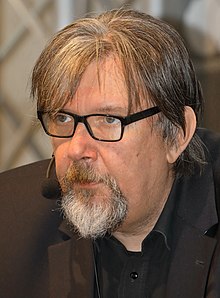Andreas P. Pittler
Andreas P. Pittler (born November 21, 1964 in Vienna ) is an Austrian writer and non-fiction author.
Life
Pittler studied history, German and political science at the University of Vienna and turned to journalism at an early age. In addition, from 1985 he published several non-fiction books, among which biographies about Bruno Kreisky , Samuel Beckett and the comedian group Monty Python stand out. He also wrote on the history of Malta , Cyprus and the Czech Republic . Pittler also made a name for himself as a critic, especially as part of a weekly column in the Wiener Zeitung . He also wrote a satirical history of Austria with Helena Verdel and published a travel guide about Europe's health spas.
Since 1990 Pittler turned more and more to fiction and published in numerous literary magazines and anthologies. His first novel was published in 2000, followed by 18 more so far.
Pittler's works have been translated into several languages, including English, French, Catalan, Slovenian and Serbo-Croatian. He is a member of several literary associations such as the PEN Club and the Syndicate .
From 2009 Pittler and Stefan Slupetzky took care of the literary corner of the Sunday radio show Trost und Rat von Willi Resetarits . Since 2010 he has also been teaching at Danube University Krems. For 2010 and 2011, Pittler is a member of the jury of the Leo Perutz Prize of the City of Vienna. Pittler is married and lives in Vienna.
In February 2012 his novel Tinnef was nominated for the Friedrich Glauser Prize . In 2013, the translation of the novels into other languages began. An American publisher is planning the complete English edition of the Bronstein series, the first volume of which was published in 2013. Zores has also been available in Serbo-Croatian since 2014 . In January 2015, Pittler was nominated for the "Homer" literature award in the short story section and was awarded the "Homer" in bronze. In 2016 his novel "Goodbye" was nominated for the Leo Perutz Prize of the City of Vienna.
From 2014, Pittler's works can also be found regularly on the Austrian bestseller lists. "Charascho" rose to number 3 (News, February 6, 2014), "Wiener Bagage" even to number 2 (Kurier, December 21, 2014). "Goodbye" also made it to second place (Die Presse, February 7, 2015), "Das Totenschiff" (TV-Media, July 15, 2016) and "Wiener Kreuzweg" (Kurier, February 26, 2017) each rose Third place, before "Viennese Resurrection" was number one on the Austrian bestseller list in April 2018 (Die Presse, April 21, 2018).
Police officer David Bronstein
The main character in Pittler's crime novels is the police officer David Bronstein, who between 1913 and 1938 had to solve various criminal cases in Vienna during the outgoing monarchy and the First Republic. Bronstein comes from an assimilated Jewish family and sees himself as a Protestant. But whether the anti-Semitism was latent at the time, he is repeatedly confronted with his origins and, whether he wants to or not, has to deal with his family history. He usually solves his cases with a certain leisurely slowness (his penchant for good food is evident, for which there must be time even in critical moments), but if the situation requires it, he can also become coarse and rough. Bronstein's cases are always embedded in an event that is significant for Austrian history, the effects of which also influence the respective criminal case. In Tacheles (2008), Bronstein got caught in the July coup of 1934 as part of his investigation , Ezzes (2009) plays around the fire of the Palace of Justice in 1927, while Chutzpah (2010) is scheduled at the time of the proclamation of the republic in 1918 . The Redl affair plays a special role in the novel Tinnef (2011) , and Zores (2012) has the end of Austria through the so-called “ Anschluss ” as a central historical theme.
What is remarkable about Pittler's Bronstein pentalogy is the fact that the novels were, as it were, published contra-chronologically. The author explains this with the fact that as a historian one has to dig deeper and deeper in order to get to the root of a social problem. The downfall of Austria is therefore the result of the political mistakes that have been made in Austria since the times of the monarchy.
A linguistic peculiarity in Pittler's Bronstein novels is the extensive use of the Viennese dialect , whereby the author pays close attention to working out the different facets of this local idiom. The coachmen, caretakers or servants speak a different language in dialect than the officials, officers or bankers. Finally, Pittler comes out in his works as a supporter of Umberto Eco's methods , because in each individual novel there are numerous small references to great works of world literature, which Pittler mostly puts into the mouths of secondary characters. The palette ranges from Thomas Bernhard to Christa Wolf to Samuel Beckett .
Works
- Shadow of stone . Ueberreuter, Vienna 2020. ISBN 978-3800080021
- Ascension of Vienna . echomedia, Vienna 2019. ISBN 9783903113442
- Bronstein . Gmeiner, Meßkirch 2019. ISBN 978-3839224366
- Monty Python . Reclam, Ditzingen 2019, ISBN 978-3150205266
- History of Austria . Papyrossa, Cologne 2018, ISBN 978-3894386795
- Resurrection of Vienna . echomedia, Vienna 2018. ISBN 978-3903113220
- The trail of icons . Gmeiner, Meßkirch 2017. ISBN 978-3839220405
- Vienna Way of the Cross . echomedia, Vienna 2017. ISBN 978-3-903113-12-1
- The death ship . Mandelbaum, Vienna 2016, ISBN 978-3-85476-494-6
- Death in the hammam . Wieser, Klagenfurt 2016, ISBN 978-3-99029-179-5
- The divine plan . Gmeiner, Meßkirch 2016, ISBN 978-3-8392-1821-1
- Goodbye . echomedia, Vienna 2015, ISBN 978-3-902900-74-6
- Viennese baggage . Gmeiner, Meßkirch 2014, ISBN 978-3-8392-1625-5
- Charascho . echomedia, Vienna 2014, ISBN 978-3-902900-52-4
- Inspector Bronstajn i slucaj ubijenog naciste . Laguna, Belgrade 2014, ISBN 978-86-521-1445-0 (Serbian translation of "Zores")
- Inspector Bronstein and the Anschluss . Ariadne Press, Riverside (CA) 2013, ISBN 978-1-57241-188-3 (English translation of "Zores")
- The Sirte's Curse . echomedia, Vienna 2013, ISBN 978-3-902900-20-3
- Zores . echomedia, Vienna 2012, ISBN 978-3-902672-82-7
- Karl Seitz . Gerold, Vienna 2011, ISBN 978-3950263190
- Cajetan fields . Gerold, Vienna 2011, ISBN 978-3-9502631-8-3
- Theodor Körner . Gerold, Vienna 2011, ISBN 978-3-9502631-7-6
- Jakob Reumann . Gerold, Vienna 2011, ISBN 978-3-9502631-6-9
- Mixed period . Gmeiner, Meßkirch 2011, ISBN 978-3-8392-1188-5
- Tinnef . echomedia, Vienna 2011, ISBN 978-3-902672-35-3
- The Bruno Kreisky Album . EWH, Vienna 2010, ISBN 978-3-9502845-9-1
- The great dream of freedom , together with Helena Verdel. Promedia, Vienna 2010, ISBN 978-3-85371-319-8
- Chutzpah . echomedia, Vienna 2010, ISBN 978-3-902672-22-3
- Ezzes . echomedia, Vienna 2009, ISBN 978-3-902672-08-7
- Tacheles . echomedia, Vienna 2008, ISBN 978-3-901761-87-4
- The document . Wieser, Klagenfurt 2006, ISBN 3-85129-621-4 .
- Samuel Beckett . German Taschenbuch-Verlag, Munich 2006, ISBN 978-3-423-31082-6 .
- So far so good! . Wieser, Klagenfurt 2004, ISBN 3-85129-474-2 .
- Czech Republic, Slovakia . Wieser, Klagenfurt c 2004, ISBN 3-85129-417-3 .
- Cyprus . Wieser, Klagenfurt 2003, ISBN 3-85129-419-X .
- Serbian beans . Wieser, Klagenfurt 2003, ISBN 3-85129-411-4 .
- From the Danube Monarchy to a united Europe . Wieser, Klagenfurt 2003, ISBN 3-85129-409-2 .
- The mayors of Vienna . Ueberreuter, Vienna 2003, ISBN 3-8000-3873-0 .
- Death in the snow . Wieser, Klagenfurt; Vienna; Ljuljana; Sarajevo c 2002, ISBN 3-85129-378-9 .
- The summer of great expectations . Resistance, Linz 2001. ISBN 978-3852850603
- The scapegoat . Wieser, Klagenfurt; Vienna; Ljubljana; Sarajevo c 2000, ISBN 3-85129-347-9 .
- Alfred Gusenbauer . Molden, Vienna 2000, ISBN 3-85485-049-2 .
- Scotland , as published by Wieser, Klagenfurt 2000, ISBN 3-85129-326-6 .
- From Ötzi to Big Bruno , together with Helena Verdel. Ueberreuter, Vienna 1999, ISBN 3-8000-3722-X .
- Dublin , as published by Wieser, Klagenfurt 1998, ISBN 3-85129-261-8 .
- Rowan Atkinson, "Mr. Bean" . Heyne, Munich 1998, ISBN 3-453-14058-3 .
- Monty Python . Heyne, Munich 1997, ISBN 3-453-12422-7 .
- Bruno Kreisky . Rowohlt, Reinbek near Hamburg 1996, ISBN 3-499-50583-5 .
- One evening before Troy . Frieling, Berlin 1994, ISBN 3-89009-573-9 .
- as editor
- Spas . Wieser, Klagenfurt 2003, ISBN 3-85129-393-2
- Far east . Wieser, Klagenfurt 2002, ISBN 3-85129-400-9 .
- Between the pen and the flag . Picus, Vienna 1993, ISBN 3-85452-249-5 .
- Prose country Austria . Wieser, Klagenfurt; Salzburg c 1992, ISBN 3-85129-067-4 .
- Search for clues . ÖBV, Vienna 1990, ISBN 3-215-07447-8 .
Audio books
- The Sirte's Curse . Speaker: Andreas Pittler, Mono Verlag , Vienna 2013. ISBN 978-3-902727-43-5
literature
- Melanie van der Hoorn: Silence, Exil and Cunning. About Andreas Pittler. Vienna 1998
- Marieke Krajenbrink: Investigating the State that nobody wanted - Austria's First Republic in Andreas Pittler's Bronstein Series. Belfast 2011
- Vincent Kling: Crime and Community - Some Context for Bronstein. In: Inspector Bronstein and the Anschluss. Riverside (CA) 2013, pp. 183-202
- Katharina Hall: Historical Crime Fiction in German. In: Katharina Hall (Ed.): Crime Fiction in German. University Press. Cardiff 2016, pp. 115-126
Awards
- 2004 Silver Medal of Honor for Services to the Republic of Austria
- 2015 bronze homer for Othello in favorites in the category "historical short story"
- 2016 Awarded the professional title "Professor"
Web links
- Homepage of Andreas Pittler
- Literature by and about Andreas P. Pittler in the catalog of the German National Library
- [1]
| personal data | |
|---|---|
| SURNAME | Pittler, Andreas P. |
| BRIEF DESCRIPTION | Austrian writer and non-fiction author |
| DATE OF BIRTH | November 21, 1964 |
| PLACE OF BIRTH | Vienna |

